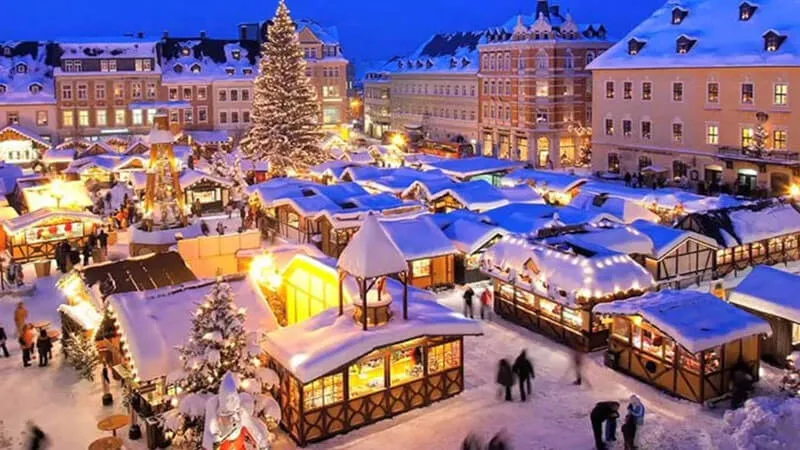As the winter holidays approach, our thoughts increasingly turn to Christmas, spending moments with our loved ones, the generous Santa Claus, and the wonderful gifts he will bring. There’s nothing quite like the unique sensation of the Christmas spirit. It wouldn’t be complete without the holiday songs that some of us play throughout the month, the traditional ugly Christmas sweaters that dads are expected to wear, and the movie marathons that make us drowsy on Christmas Eve.
During this joyful, magical, and celebratory season, we often find ourselves more open-hearted and take time to reconnect with friends globally. That’s why I thought sharing how to wish someone Merry Christmas in different languages would be helpful.
You can send a brief message, write a heartfelt email, or tag them in a quick tweet. Regardless of the method, share some love this Christmas and show your friends abroad that they’re on your mind. Here’s how to say Merry Christmas in different languages, which is what the nationalparkshops team wants to bring for you.
>> Maybe you interested: Top 7 Best Christmas Mugs Make Holiday Season Merrier
Merry Christmas in German
During my visit to Germany last winter, I experienced the enchanting Christmas markets filled with lights, decorations, and the aroma of roasted chestnuts. The locals greeted each other with “Frohe Weihnachten,” which added to the festive atmosphere.
There is nothing like the charm and coziness of a Christmas market in Germany. If you haven’t experienced one yet, make sure to visit this year. Christmas in Germany is absolutely delicious!
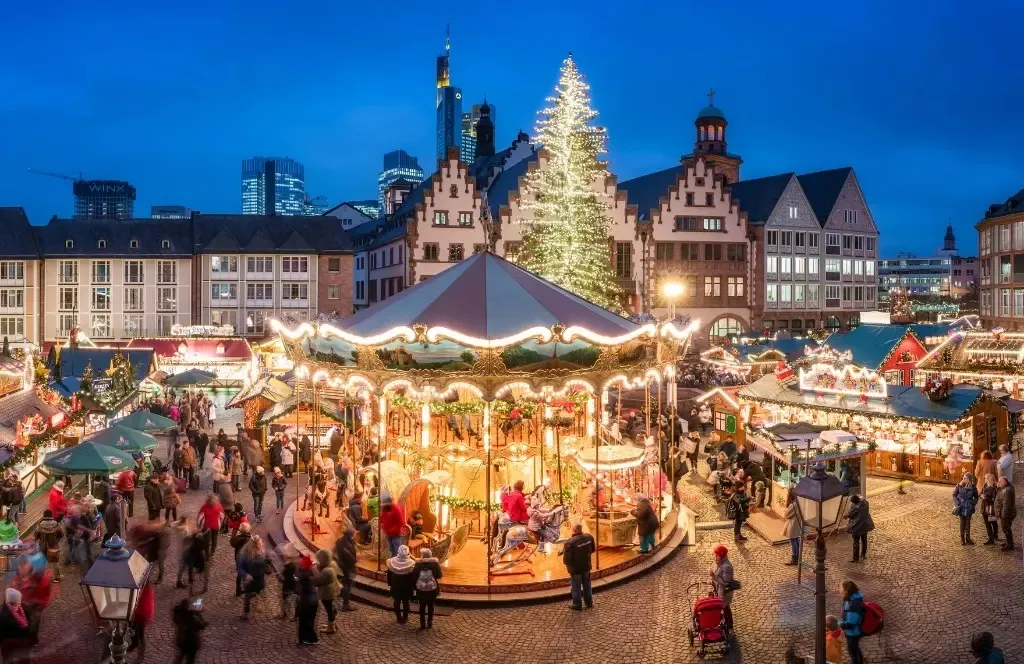
Merry Christmas in Greek
As for saying Merry Christmas in different languages, Greek is also a popular language for tourists as it has started to become a popular place to visit in winter (probably).
The Greek term for Christmas is Christougena or Christougenna, which translates directly to “Christ’s birth.” When Greeks wish others a “Merry Christmas,” they use the phrase “Kala Christougena.” The g sound in this context is pronounced as a y.
In the winter tourist season, you might often come across it as Kalo Christougenna; however, kala is also acceptable. In Greek script, “Merry Christmas” is rendered as Καλά Χριστούγεννα.
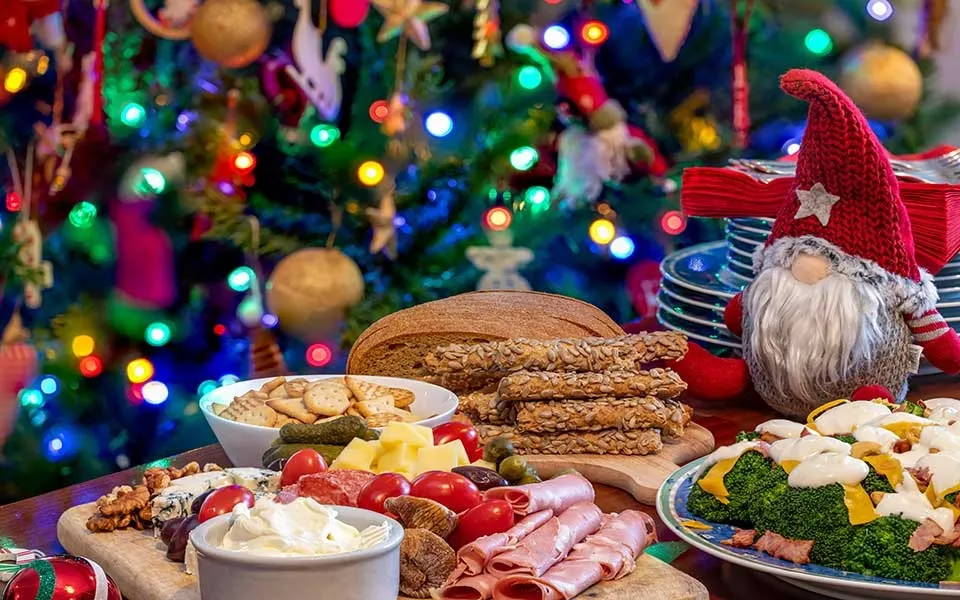
Merry Christmas in Arabic
Do you know any ways to wish someone a Merry Christmas in different languages – Arabic?
In Arabic-speaking countries, “Merry Christmas” is expressed as “عيد ميلاد مجيد” (Eid Milad Majid).
While visiting Jordan, I learned that Christmas is celebrated by both Christians and Muslims alike. The phrase “Eid Milad Majid” reflects the joyous spirit of the occasion. Sharing this greeting can open doors to meaningful conversations about cultural practices and beliefs surrounding the holiday.
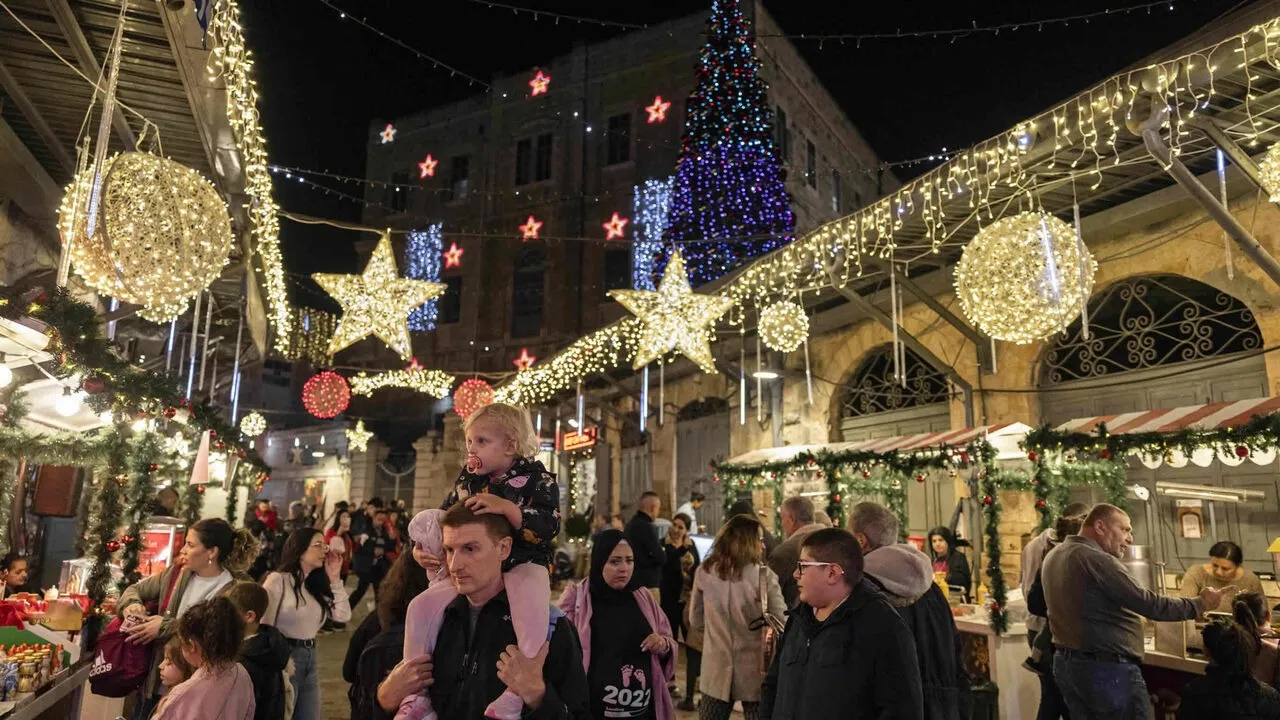
Merry Christmas in Chinese
In the Mandarin Chinese language, the phrase for Merry Christmas is “圣诞快乐” (Shèngdàn kuàilè). Despite the fact that Christmas isn’t a holiday that has roots in traditional Chinese culture, its joyful essence and celebratory customs have become increasingly popular, largely thanks to the influence of tourism.
Urban areas such as Hong Kong and Shanghai sparkle with vibrant lights during this time of year, and people celebrate the occasion by exchanging gifts and adorning their surroundings with festive decorations.

Merry Christmas in Spanish
Spanish-speaking cultures convey their holiday greetings with “Feliz Navidad” – This is popular ways to say Merry Christmas in different languages.
In Spain and Latin America, Christmas celebrations frequently last for several weeks, beginning with Las Posadas, a nine-day event that depicts Mary and Joseph’s trip to Bethlehem. The festivities peak on Nochebuena (Christmas Eve), featuring a lavish meal that includes traditional foods like bacalao (salted cod) and tamales.
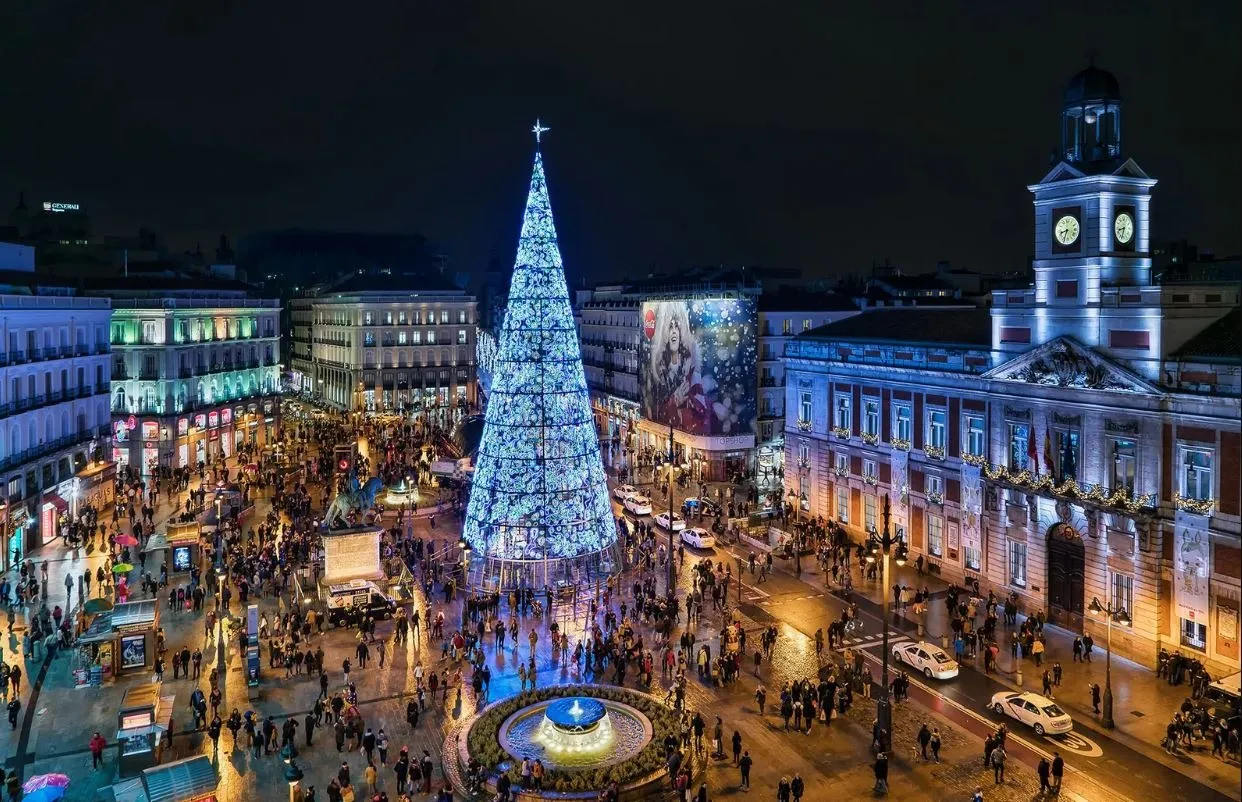
Merry Christmas in Portuguese
Portuguese speakers express their holiday greetings by saying “Feliz Natal” This phrase is also used for wishing a Merry Christmas in Brazil. Both Portugal and Brazil celebrate Christmas with colorful street decorations, nativity displays, and the well-known Bolo Rei, a fruitcake adorned with nuts and candied fruit.
A beloved tradition is the Midnight Mass, referred to as Missa do Galo (Rooster’s Mass), where families gather to commemorate the birth of Christ.
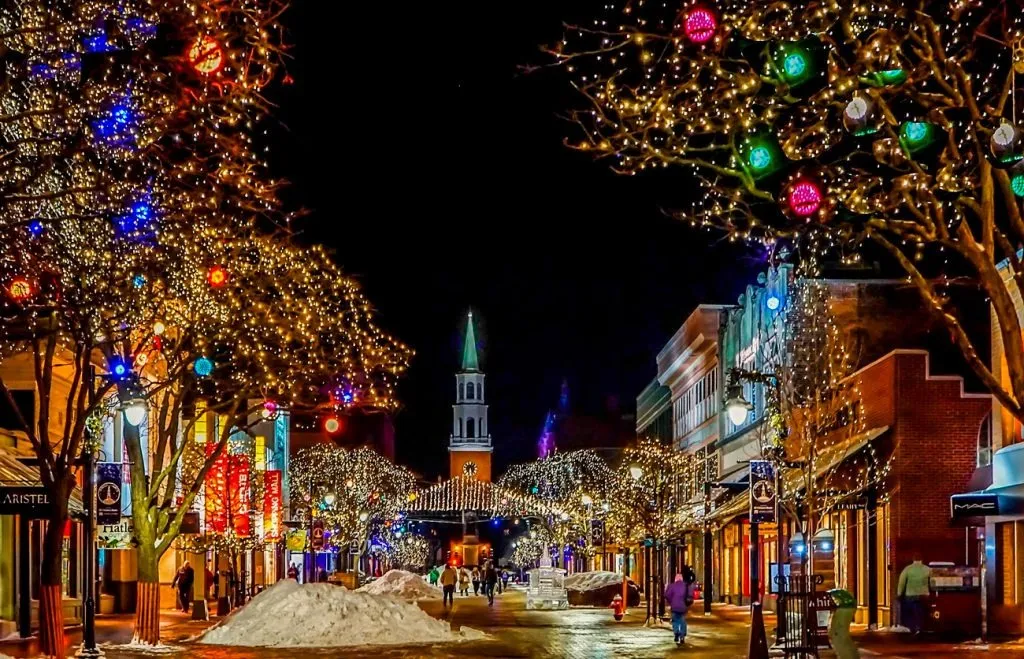
Merry Christmas in French
Discover how to wish someone a Merry Christmas in different languages – French.
Embrace the festive atmosphere of a French Christmas by mastering essential vocabulary and preparing milk and cookies for Père Noël (which translates to Father Christmas).
The key phrase for Christmas to remember is undoubtedly “Merry Christmas.” In French, this translates to Joyeux Noël. Joyeux means “joyous,” and Noël refers to “Christmas.”
This phrase is the most frequently used during the holiday season, and you’re likely to hear it often as Christmas approaches. Here are a couple of examples:
Bonsoir! Joyeux Noël! – Good night! Merry Christmas!
Je vous souhaite un Joyeux Noël ! – I wish you a Merry Christmas!

Merry Christmas in Italian
Italians express the joy of the season with the greeting “Buon Natale”. In Italy, Christmas is a magical period filled with beautiful nativity displays, lively markets, and grand meals. La Vigilia, or Christmas Eve, features an extravagant seafood dinner known as the Feast of the Seven Fishes, representing the anticipation of Jesus’s birth at midnight.
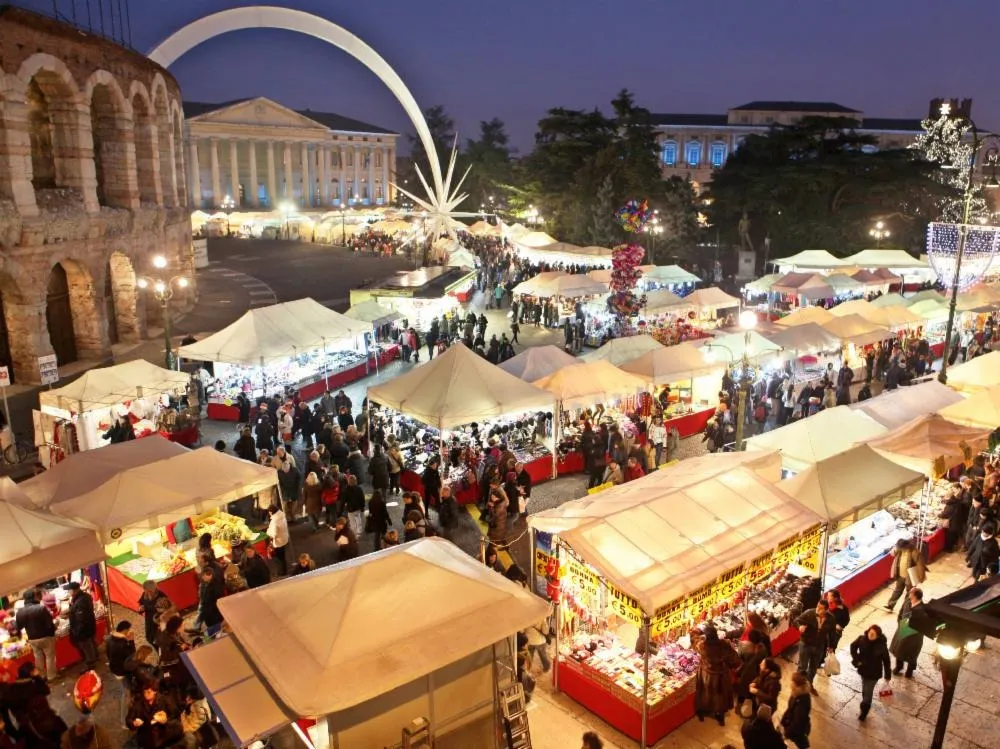
Merry Christmas in different languages – Russian
In Russia, Christmas celebrations officially take place on January 6th. This is due to the Russian Orthodox Church’s adherence to the Julian calendar, while much of the world has adopted the Gregorian calendar. The standard greeting for “Merry Christmas” in Russian is “S Rozhdyestvom Hristovym!”, translating to “Congratulations on the birth of Christ!”. Since the exact date of Jesus’ birth is unknown, many Russians choose to celebrate Christmas starting December 24th and continuing until January 6th. This means you get to say “Merry Christmas” in Russian twice!
There’s also a simpler phrase, “S Prazdnikom!”, which means “Happy holiday!”. However, your Russian friends and colleagues will truly appreciate it if you make an effort to learn the correct way to say “Merry Christmas” in their language. A month prior to the celebration, you’ll notice numerous banners, billboards, and posters wishing people a Merry Christmas everywhere. Although remembering the phrase might require some initial effort, it won’t be too challenging. The most popular expression remains “Schastlivogo Rozhdestva!“, which translates to “Merry Christmas” in Russian.
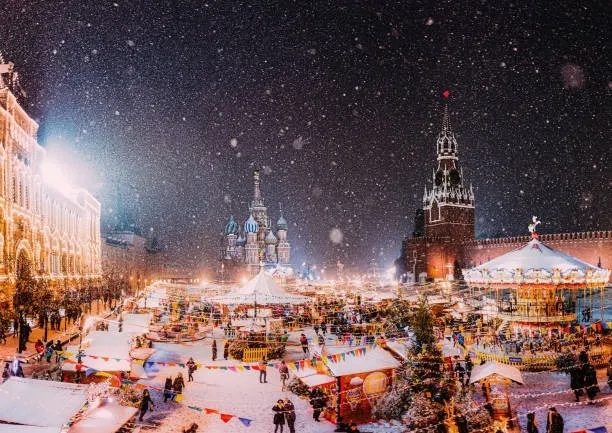
Merry Christmas in Danish
In Denmark, you would say “Glædelig Jul” instead of Merry Christmas. This is one of the interesting ways of saying Merry Christmas in different languages.
The Julemanden, which translates to “Christmas Man” or “Yule Man,” is believed to deliver gifts to children who have been well-behaved throughout the year. Julemanden closely resembles Santa Claus, resides in Greenland, travels in a sleigh drawn by reindeer, and enjoys rice pudding.
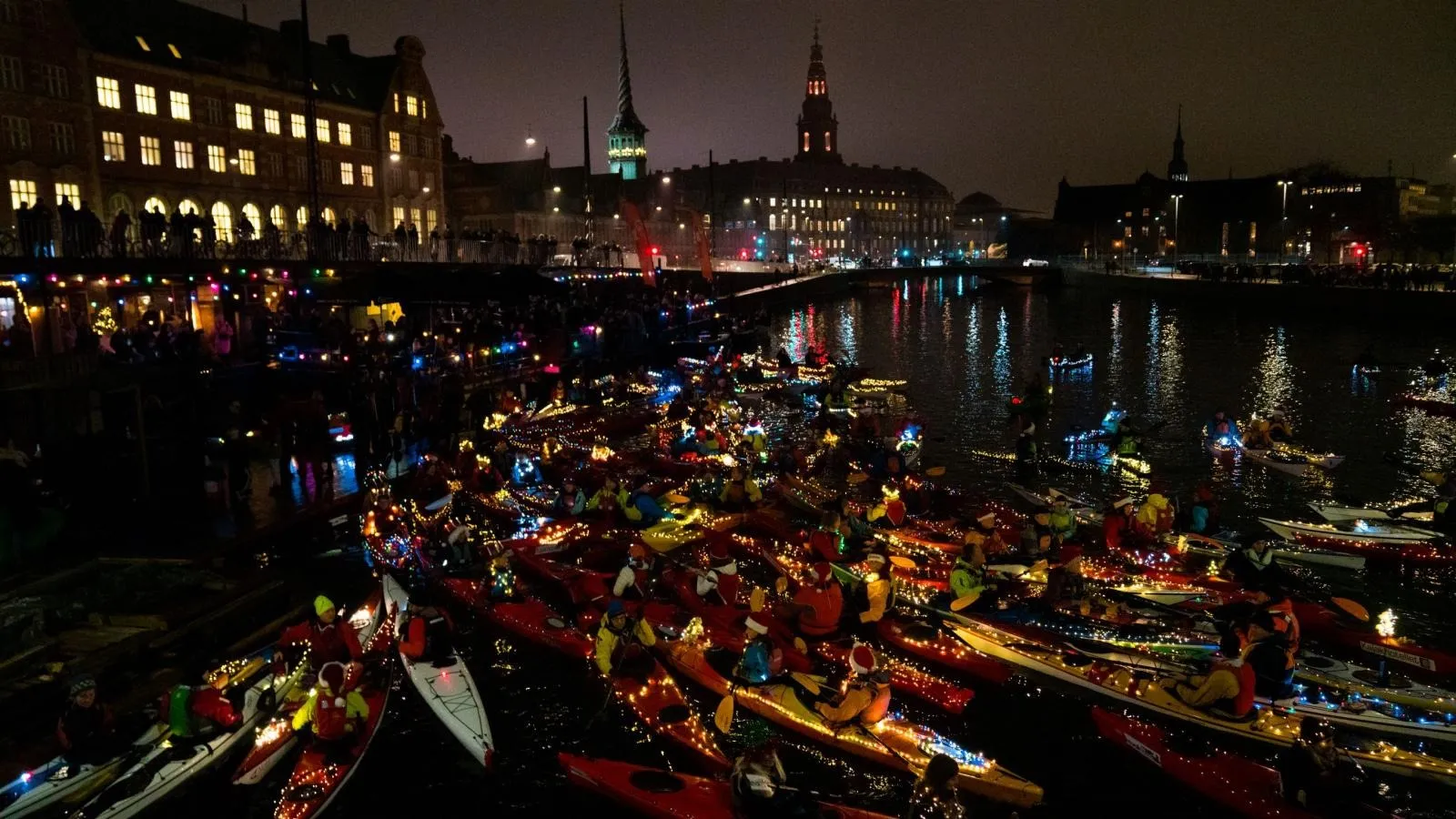
Merry Christmas in Dutch
Individuals who speak Dutch extend holiday greetings to one another by saying “Vrolijk Kerstfeest“, which translates to “Merry Christmas.” In the Netherlands, the celebration of Sinterklaas occurs on December 5th and involves the exchange of gifts along with lively parades filled with joy and festivity.
The Christmas season is characterized by the concept of gezelligheid, which embodies a sense of coziness and warmth, often accompanied by intricate meals that include gourmet, a cherished tradition of communal cooking where friends and family prepare food together.
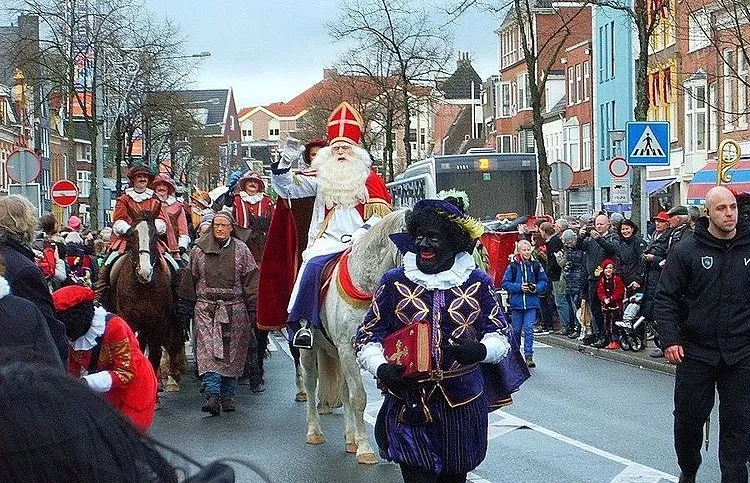
Merry Christmas in Japanese
Another way to say Merry Christmas in different languages that is also searched by many people (I think) – Japanese.
In Japan, people express their Christmas greetings by saying “メリークリスマス” (Merī Kurisumasu), which translates to “Merry Christmas.” The celebration of Christmas in Japan is largely secular and is characterized by spectacular light displays, romantic dining experiences, and a unique tradition of eating Kentucky Fried Chicken. This unusual Christmas meal was popularized through a marketing strategy that emerged in the 1970s, which has since become a staple for many during the holiday season.

Merry Christmas in different languages – Korean
In South Korea, approximately 30% of the population identifies as Christian, which leads to a significant number of individuals participating in church services on Christmas Day. Following these religious observances, many families take the opportunity to enjoy quality time together or indulge in shopping excursions.
Another festive custom includes what is referred to as the “One Thousand Four Angel Santas” (1004명의 산타), where groups of volunteers dedicate their holiday efforts to providing gifts for orphans and distributing meals to elderly individuals in need.
In the Korean language, the phrase “Merry Christmas” is written as 메리 크리스마스.
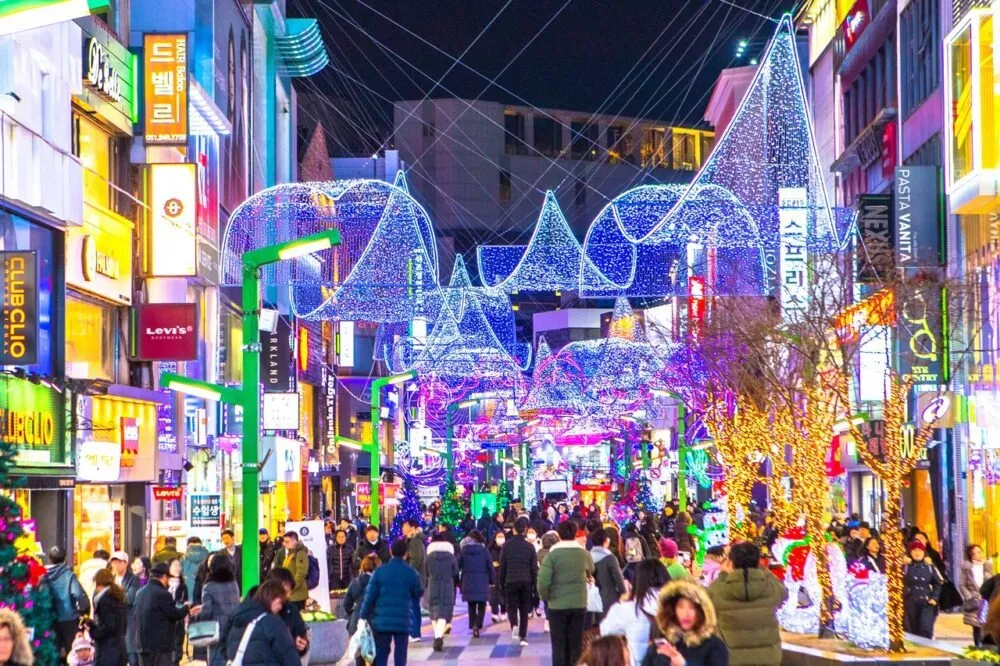
Merry Christmas in Vietnamese
In Vietnamese, people convey their Christmas greetings by saying “Giáng Sinh Vui Vẻ /zian sin vui ve/” which translates to “Merry Christmas.” Within Vietnam, Christmas is celebrated as a vibrant and cheerful event characterized by colorful decorations that adorn homes and streets. The festivities often include lively parades that create an energetic atmosphere, bringing together both locals and visitors in celebration.
One of the endearing traditions associated with this holiday is the exchange of gifts among family and friends, where a popular choice is bánh tráng nướng. This delightful treat is essentially grilled rice paper that is filled with a variety of flavorful ingredients, making it a unique and cherished part of the Christmas festivities.
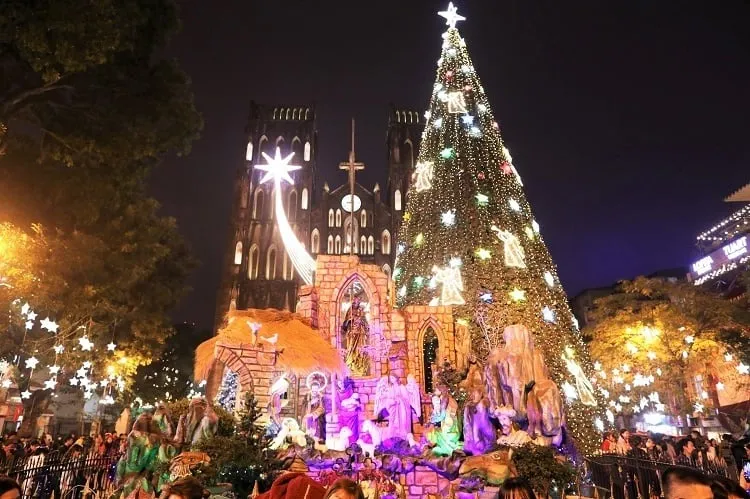
Merry Christmas in Latin
Discover how to wish someone a Merry Christmas in different languages – Latin.
To express “Merry Christmas” in Latin, the appropriate phrase is “Felicem Natalem Christi”. This phrase is constructed from several Latin words: “felicem”, which translates to ‘happy’ or ‘joyful’; “natalem”, referring to ‘birthday’ or ‘nativity’; and “Christi,” the genitive case of “Christus,” signifying Christ. Consequently, “Felicem Natalem Christi” can be interpreted as either “happy birthday of Christ” or “joyful nativity of Christ,” both of which honor the birth of Jesus Christ.
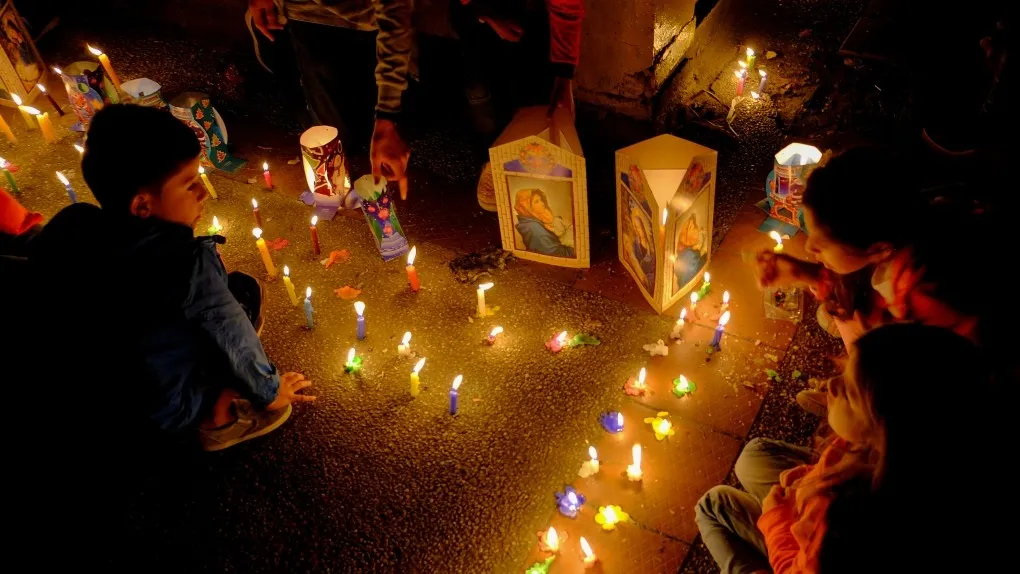
Say Merry Christmas in other languages around the world
European languages
- Albanian: Gëzuar Krishtlindja
- Aragonese: Feliz nadal
- Armenian: շնորհավոր Սուրբ Ծնունդ (šnorhavor Surb Cnund)
- Asturian: Feliz navidá
- Azerbaijani: Xoşbəxt milad
- Basque: Eguberri on
- Belarusian: з Калядаамі (z Kaljadámi), з Нараджэннем (z Naradžénnjem), з Нараджэннем Хрыстовым (z Naradžénnjem Xrystóvym)
- Bosnian: Srećan Božić, Sretan Božić
- Breton: Nedeleg laouen
- Bulgarian: Весела Коледа (Vesela Koleda)
- Catalan: Bon Nadal
- Cornish: Nadelik Lowen
- Corsican: Bon Natale è pace è salute
- Croatian: Sretan Božić
- Czech: Veselé Vánoce
- Danish: glædelig jul, god jul
- Dutch: Vrolijk kerstfeest, prettig kerstfeest
- English: Merry Christmas, Happy Christmas
- Esperanto: Ĝojan Kristnaskon
- Estonian: Häid jõule
- Faroese: Gleðilig jól
- Finnish: Hyvää joulua, Hauskaa joulua
- French: Joyeux Noël
- Frisian (West): Noflike krystdagen
- Galician: Bo Nadal
- Georgian: შობას გილოცავთ (šobas gilocavt)
- German: Frohe Weihnachten, Fröhliche Weihnachten
- Greek: Καλά Χριστούγεννα (kalá Christoúgenna)
- Greenlandic: Juullimi pilluarit, Juullisiorluarit
- Hungarian: Boldog karácsonyt
- Icelandic: Gleðileg jól
- Irish: Nollaig Shona
- Italian: Buon Natale
- Latin: Felix dies Nativitatis, Natale Hilare
- Latvian: Priecīgus Ziemassvētkus
- Lithuanian: Linksmų Kalėdų
- Luxembourgish: Schéine Chrëschtdag
- Macedonian: Среќен Божиќ (Sreḱen Božiḱ), Христос се роди (Hristos se rodi), Навистина се роди (Navistina se rodi) (reply to “Hristos se rodi”)
- Maltese: il-Milied it-Tajjeb
- Moksha: Роштува мархта (Roštuva marxta)
- Norman: Un bouan Noué (Jersey)
- Norwegian: god jul
- Occitan: Bon Nadal
- Polish: Wesołych Świąt, Wesołych Świąt Bożego Narodzenia
- Portuguese: Feliz Natal
- Romanian: Crăciun fericit
- Russian: с Рождеством (s Roždestvóm), с Рождеством Христовым (s Roždestvóm Xristóvym), Весёлого Рождестваа (Vesjólovo Roždestvá), Счастливого Рождестваа (Sčastlívovo Roždestvá)
- Sami (Lule): Buorre javla
- Sami (Northern): Buorit juovllat
- Sami (Southern): Buerie jåvle
- Sardinian: Bona Pasca de Nadale
- Scottish Gaelic: Nollaig Chridheil
- Serbian: Срећан Божић (Srećan Božić), Сретан Божић (Sretan Božić), Христос се роди (Hristos se rodi), Ваистину се роди Vaistinu se rodi (reply to “Hristos se rodi”)
- Silesian: Radosnych Godōw
- Slovak: Veselé Vianoce
- Slovene: Vesel božič
- Sorbian (Lower): Wjasołe gódy
- Sorbian (Upper): Wjesołe hody
- Spanish: feliz Navidad
- Swedish: God jul
- Turkish: Mutlu Noeller
- Ukrainian: з Різдвом (z Rizdvóm), з Різдвом Христовим (z Rizdvóm Xrystóvym)
- Welsh: Nadolig Llawen
- Yiddish: אַ פֿריילעכן ניטל (a freylekhn nitl)
Asian languages
- Arabic: عِيد مِيلَاد مَجِيد (ʿīd mīlād majīd), مِيلَاد مَجِيد (mīlād majīd)
- Armenian: շնորհավոր Սուրբ Ծնունդ (šnorhavor Surb Cnund)
- Azerbaijani: xoşbəxt milad
- Burmese: Hnit thit ku mingalar pa
- Cebuano: Malipayong pasko
- Chinese (Mandarin): 聖誕快樂, 圣诞快乐 (Shèngdàn kuàilè), 聖誕節快樂, 圣诞节快乐 (Shèngdànjié kuàilè)
- Georgian: შობას გილოცავთ (šobas gilocavt)
- French: Joyeux Noël
- Hebrew: חג מולד שמח (khag molad sameakh)
- Hindi: शुभ बड़ा दिन (śubh baṛā din), शुभ क्रिस्मस (śubh krismas), मेरी क्रिसमस (merī krismas), क्रिसमस मुबारक (krismas mubārak)
- Indonesian: selamat hari Natal, selamat Natal
- Japanese: メリークリスマス (Meri Kurisumasu)
- Javanese: Sugeng Natal
- Jingpho: Ngwi pyaw ai X’mas rai u ga
- Karo Batak: Selamat wari Natal
- Kazakh: рождество құтты болсын (rojdestvo quttı bolsın)
- Khmer: រីករាយថ្ងៃបុណ្យណូអែល (riikriəythngaybonyɔɔnouʾael), បុណ្យណូអែល (bon-nouʾael)
- Korean: 즐거운 성탄절 (jeulgeoun seongtanjeol), 메리 크리스마스 (meri keuriseumaseu)
- Kyrgyz: Жаратканнын туысымен (Caratkannın tuısımen)
- Lao: ສຸກສັນວັນຄຣິດສມາດ (suk san wan kha rit sa māt)
- Malay: Selamat hari Natal, selamat Natal
- Mongolian: Зул сарын мэнд хүргэе (Zul saryn mend hürgeje)
- Persian: میلاد مسیح مبارک باد (milâd-e masih mobârak bâd), کریسمس مبارک (kerismas mobârak)
- Sinhalese: සුභ නත්තලක් (subha nattalak)
- Sundanese: Wilujeng Natal
- Tagalog: Maligayang pasko
- Tajik: Мавлуди Исо муборак (mavludi Iso muborak)
- Tamil: கிறிஸ்துமஸ் நல்வாழ்த்துக்கள் (kiṟistumas nalvāḻttukkaḷ)
- Telugu: మెర్రీ క్రిస్మస్ (merrī krismas)
- Thai: สุขสันต์วันคริสต์มาส (sùk-sǎn wan krís-mâas)
- Turkish: Mutlu Noeller
- Urdu: کرسمس مبارک (krismas mubārak), میری کرسمس (merī krismas), شبھ کرسمس (shubh krismas), شبھ بڑا دن (shubh baṛā din)
- Uzbek: Rojdestvo muborak
- Vietnamese: Chúc mừng Giáng sinh, Chúc mừng Nô-en, Chức mừng Giáng sinh, Chức mừng Nô-en
African languages
- Afrikaans: Geseënde kersfees
- Akan: Afishapa
- Amharic: መልካም ገና (mälkam gäna)
- Arabic: عِيد مِيلَاد مَجِيد (ʿīd mīlād majīd), مِيلَاد مَجِيد (mīlād majīd)
- Chichewa: khrisimasi yabwino
- English: Merry Christmas, Happy Christmas
- Ewe: Blunya na wo
- French: Joyeux Noël
- Portuguese: Feliz Natal
- Swahili: Heri ya Krismasi, Krismasi njema
- Zulu: uKhisimusi oMuhle
American languages
- Alutiiq: Nunaniqsaakici Aʀusistuami
- Aymara: Sooma nawira-ra
- Cherokee: ᎤᏬᏢᏗ ᏓᏂᏍᏓᏲᎯᎲ (uwotlvdi danisdayohihv)
- English: Merry Christmas
- Greenlandic: Juullimi pilluarit, juullisiorluarit
- Haitian Creole: Jwaye Nowèl
- Hawaiian: Mele Kalikimaka
- Lushootseed: Haʔɬ pədx̌aʔx̌aʔ
- Navajo: Yáʼátʼééh Késhmish, Nizhónígo Késhmish Adííłeeł
- Papiamentu: Bon Pascu
- Portuguese: Feliz Natal
- Spanish: Feliz Navidad
- Yup’ik: Alussistuaqegtaarmek piamken, Alussistuaqegcikici (plural subject, plural object)
Conclusion
The phrase “Merry Christmas” takes on new forms and sounds across the globe, yet the sentiment remains universally heartwarming. So, as you gather with loved ones this holiday season, why not add a global twist to your greetings? Share Merry Christmas in different languages and spread a little extra cheer around the world. After all, the magic of Christmas lies in its ability to unite us all, no matter where we come from or what language we speak. Wishing you a joyful and multilingual holiday season!

